© 2014 The Texas Lawbook.
By Natalie Posgate (September 22) – Last year, a Dimmit County jury awarded $281 million to the family of a deceased man who was the victim of a commercial truck crash in South Texas near the Eagle Ford Shale.
This past April, an El Paso jury awarded $4.6 million against three trucking companies for a 2010 accident that left two men dead. That same month, a Dallas jury awarded a Mississippi woman $4.1 million for severe injuries she suffered in a 2011 accident with an 18-wheeler while traveling through Texas on I-20.
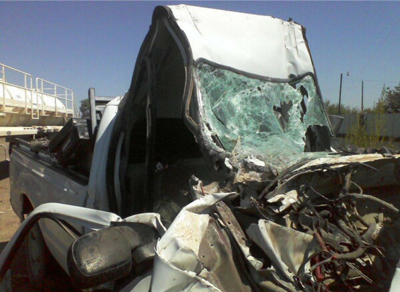
The number of serious or deadly crashes involving commercial trucks hauling materials in the oil and gas boom has skyrocketed during the past three years.
The jump in commercial trucking crashes combined with a series of six, seven, eight and even nine-digit jury verdicts has led to a significant spike in litigation in Texas.
Plaintiffs and commercial defense lawyers around the state say they expect trucking industry lawsuits to continue to increase as long as business in the Eagle Ford and Permian Basin shale plays continues to boom.
Trucking litigation has become so hot that even the Texas Hammer is broadcasting advertisements seeking victims.
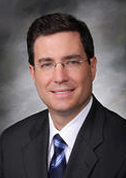
“Our firm has signed twice as many 18-wheeler and large commercial truck cases in the last year or two than in the same period before that,” said Houston attorney Vuk Stevan Vujasinovic of the personal injury firm, VB Attorneys. “We’re going to continue to see more and more over time.”
Vujasinovic and others have pointed to the oil and gas boom as a frontrunner for the increase in trucking litigation.
And numbers indicate that the boom is only going to continue. According to a study released this summer by the University of Texas at San Antonio Institute for Economic Development, the oil and gas play in the West Texas region alone will produce $20.5 billion in economic output in 2022.
With that boom comes higher demand for commercial trucks, which experts say causes the overwhelmed trucking companies to put more 18-wheelers on the state’s roads – many of which lack the infrastructure to accommodate the influx.
Naturally, this leads to more accidents.
Recent Texas Department of Transportation statistics obtained by The Texas Lawbook reveal that fatal crashes in the Eagle Ford Shale area alone, which stretches across 26 counties, increased by 19 percent from 2009 to 2013. Thirty percent of those crashes involved a commercial vehicle last year – a 191 percent increase from 2009, when commercial vehicles only accounted for 12 percent of the fatal crashes.
As a result, litigation is on the rise.

“You’re seeing lawyers who might handle an occasional truck wrecking case who are now seeing a much higher volume,” said Austin attorney Mike Davis of the prominent Texas personal injury law firm, Slack & Davis.
“I think everyone perceives that there’s been a major uptick in the number of truck wrecks,” he added. “If fatalities are up… that in the natural is going to lead to more litigation.”
The great increase in accidents that caused fatalities or serious injuries around the state is disturbing enough, but 18-wheelers and commercial trucks’ growing involvement in those accidents is perhaps the biggest shock.
In West Texas’ Permian Basin region, for example, there were 317 fatal crashes in 2013, a 40 percent increase from 2009. Commercial vehicles were involved in 77 of those fatal crashes, which is 208 percent more than their accountability in 2009, which was 25 fatal accidents.
The outcome is similar for crashes that resulted in serious injuries. Commercial trucks’ involvement in those kinds of crashes increased by 98 percent from 2009 to 2013 in the Permian Basin region, which saw 4,080 of these crashes last year.
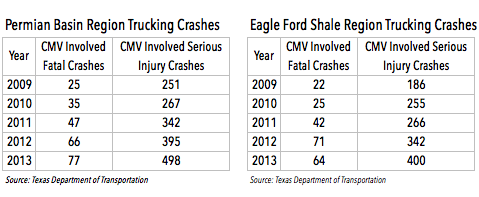
Why it’s happening
Davis and other attorneys who handle trucking litigation point to many factors in the surge of trucking accidents, but they say an obvious one is the amount of fatigue drivers face while trying to meet the fast-paced demands of their oil and gas clients.
Under federal law, truck drivers must take off 34 consecutive hours after a 60 or 70-hour workweek. But an exception to the rule, the Oilfield Exemption, allows commercial vehicle operators who exclusively serve the oil and gas industry to reset their workweek after 24 hours off instead – something Davis said is putting more fatigued drivers on roads.
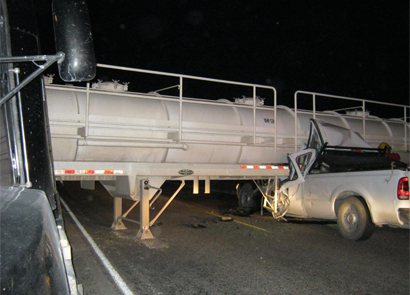
Davis said the exemption is only supposed to apply to a very small category of drivers who transport special equipment. But some companies are interpreting the provision more broadly by applying it to equipment “never intended” to apply to the rule, he said.
He added that drivers often spend a substantial amount of time on-site waiting for equipment to be ready to load, which is time that is considered off-duty. Ideally, drivers are resting during their waiting time. Realistically, the drivers are assigned to help out with other duties – which makes drivers’ shifts longer than they should be, he said.
“The reality of those job sites is, it’s organized chaos out there,” Davis said.
Mesquite personal injury attorney Ron McCallum agreed, adding that some drivers are even working two driving jobs to make ends meet, since transportation services to and from the fracking sites are needed 24 hours a day.
“They’re all overworked,” McCallum said. “When you’re overworked and fatigued, that’s when things happen. I don’t care if your truck is brand new.”
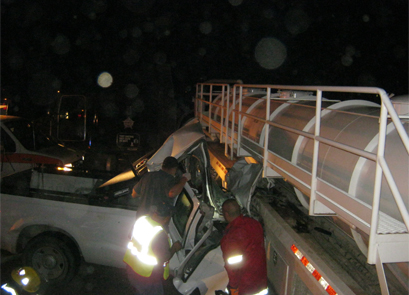
Recently, McCallum won a favorable settlement for a client who was severely injured in a 2012 wreck that occurred late at night on RR-2119 in Reeves County.
The crew truck McCallum’s client was a passenger in collided with the oilrig trailer portion of an 18-wheeler that was blocking both the northbound and southbound sides of RR-2119 due to getting stuck during an attempted U-turn. McCallum’s complaint stated the 18-wheeler driver “did nothing to provide warning of the trailer’s precarious position to oncoming traffic in either direction.”
The accident killed the driver of the crew truck (the family of whom McCallum also represented) and injured McCallum’s surviving client so badly that it “broke every bone inside of his body” and caused a severe brain injury.

“He was the most hurt person who did not die [from a trucking accident] that I’ve ever represented,” McCallum said.
Companies’ failure to properly maintain their large trucks is another accident-causer, legal experts say.
A report published last year by the Texas Department of Transportation revealed that in 2012, 58 percent of the 215 randomly inspected commercial trucks in Dimmit County – the same county the deceased Aguilar’s accident took place in that resulted in a $281 million award to Aguilar’s family – were taken out of service for not meeting Texas Department of Public Safety standards. In the same inspections, 23 drivers were found unqualified to operate the commercial vehicles.
Dimmit County’s numbers for out-of-service vehicles exceeded the statewide statistics by more than double the amount, which said 25 percent out of the 8,000 inspected commercial vehicles did not meet DPS standards.
In the Aguilar case, a drive shaft broke off a truck employed by the oil patch trucking company, Heckmann Water Resources, and bulldozed through the windshield of the vehicle Aguilar was a passenger in. Both vehicles were traveling on FM 133 in Carrizo Springs. The May 2012 accident killed Aguilar, who was a military veteran in his thirties. Family members of Aguilar claimed in their lawsuit that the drive shaft broke because Heckmann did not properly maintain the tractor-trailer.
Last December, a Dimmit County jury found Heckmann and its parent company, Nuverra Environmental Solutions, Inc. responsible and awarded the family $281 million. The case officially settled in July, but the awarded damages got slashed to about $105 million, according to a lawyer close to the case.
Attorneys on both the plaintiffs and defense ends also pointed out that the fast-pace environment of the oil patch trucking industry often causes companies to hire less skilled drivers and to be more lax on the screening portion of the hiring process.

Zach Mayer, a partner at Kane Russell Coleman & Logan in Dallas, emphasized that there are plenty of trucking companies that put safety first, but, like any industry, there are the outliers who are out “to make a quick dollar,” which leads them to use a less thorough screening and hiring process.
He pointed out that the companies that cut corners are often the small mom and pop shops, because they often do not have the resources to be picky when hiring drivers.
“Hiring quality drivers can be time consuming and expensive,” said Mayer, who has defended large companies such as FedEx in trucking litigation. “[Sometimes the] driver’s a guy who was working two weeks ago in fast food.”
Dallas attorney Eddy Davis of Hartline Dacus Barger Dreyer agreed.
“I do see companies struggling to keep good drivers,” he said. “When that happens, they end up putting a not-so-good driver (behind the wheel), whether it be accident, criminal history or past drug or alcohol issues, and give them the benefit of the doubt.”
Davis used to specialize in defending companies in products liability and industrial accidents. But over the past several years, his practice has shifted to primarily defending trucking companies and commercial vehicle operators after accidents.
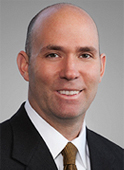
Davis and others acknowledged that another big factor in the shift of his practice’s focus derives from the obstacle the state’s tort reform has created for plaintiffs lawyers to recover significant damages in a majority of personal injury litigation. Many found that trucking litigation is one of the few areas that remained lucrative after the laws took effect.
“Tort reform has made medical malpractice litigation go away, and it used to be that products liability was pretty stable plaintiffs work,” said Davis, adding that even minor trucking accidents provide good work for plaintiffs lawyers, since even mom and pop shops often will have the insurance “to fund or [settle] the claim.”
While there’s no question that the amount of fatal truck wrecks has skyrocketed, Davis pointed out that he has also seen his fair share of minor accidents play their way in the trucking litigation boom.
He believes this is happening because “more people are becoming aware” of the high-dollar insurance policies commercial vehicle operators are required to carry in order to operate. For example, 18-wheelers that carry hazardous material – such as those that deliver drilling materials to the shale plays – must have $1 million worth of coverage, according to the Texas Department of Motor Vehicles.
“It does seem to me that there’s more of a tendency to sue anytime there’s a wreck involving an 18-wheeler,” he said.
Prominent Dallas personal injury attorney Frank Branson said he expects the influx of trucking litigation and accidents to continue in the following years, and the stop to the increase will depend greatly on what else TxDOT and federal regulatory agencies do to crack the whip on trucking companies for safety issues.
“Trucking companies are not voluntarily making safety changes any more than the oilfield industry,” he said. “Once it becomes more profitable to put safety ahead of profits instead of vice versa, there will be less injuries and less death.”
Branson added that change is crucial because everyone on the roads is at risk of being involved in a trucking accident.
“We don’t have any control at all for being subject to the danger of trucks,” he said.
Advice to trucking companies
Mayer and HBDB’s Davis said accidents inevitably lead to litigation, but there are plenty of proactive and preventative measures trucking companies can take to ease the litigation process – and prevent the litigation-causing crashes from happening in the first place.
“There’s nothing you can do to help them avoid litigation,” Davis said. “If they happen to get in an accident, they’re going to get sued.”
However, if resources allow companies to put a stronger effort in hiring better and training better, it is the best way to prevent crashes, Davis added.
Mayer emphasized that once an accident happens, resolving matters as early as possible is the best approach to take.
“Get in front of the accident and investigation early on, and in case of liability, get in front of victims and their family as quickly as you can,” he said.
Video for this article was produced by Paige Kerley.
© 2014 The Texas Lawbook. Content of The Texas Lawbook is controlled and protected by specific licensing agreements with our subscribers and under federal copyright laws. Any distribution of this content without the consent of The Texas Lawbook is prohibited.
If you see any inaccuracy in any article in The Texas Lawbook, please contact us. Our goal is content that is 100% true and accurate. Thank you.
